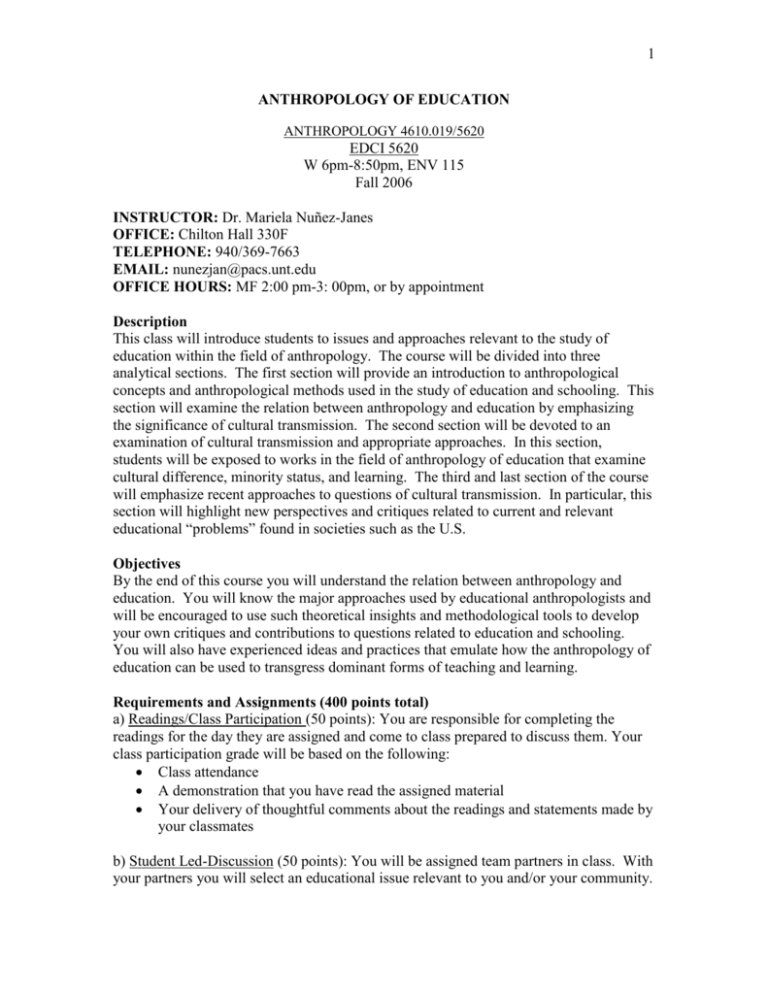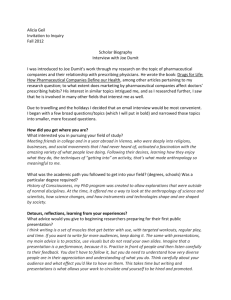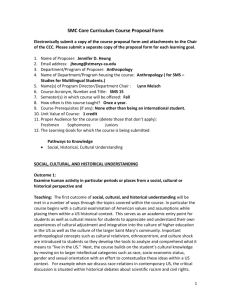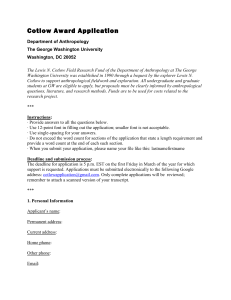ANTHROPOLOGY OF EDUCATION
advertisement

1 ANTHROPOLOGY OF EDUCATION ANTHROPOLOGY 4610.019/5620 EDCI 5620 W 6pm-8:50pm, ENV 115 Fall 2006 INSTRUCTOR: Dr. Mariela Nuñez-Janes OFFICE: Chilton Hall 330F TELEPHONE: 940/369-7663 EMAIL: nunezjan@pacs.unt.edu OFFICE HOURS: MF 2:00 pm-3: 00pm, or by appointment Description This class will introduce students to issues and approaches relevant to the study of education within the field of anthropology. The course will be divided into three analytical sections. The first section will provide an introduction to anthropological concepts and anthropological methods used in the study of education and schooling. This section will examine the relation between anthropology and education by emphasizing the significance of cultural transmission. The second section will be devoted to an examination of cultural transmission and appropriate approaches. In this section, students will be exposed to works in the field of anthropology of education that examine cultural difference, minority status, and learning. The third and last section of the course will emphasize recent approaches to questions of cultural transmission. In particular, this section will highlight new perspectives and critiques related to current and relevant educational “problems” found in societies such as the U.S. Objectives By the end of this course you will understand the relation between anthropology and education. You will know the major approaches used by educational anthropologists and will be encouraged to use such theoretical insights and methodological tools to develop your own critiques and contributions to questions related to education and schooling. You will also have experienced ideas and practices that emulate how the anthropology of education can be used to transgress dominant forms of teaching and learning. Requirements and Assignments (400 points total) a) Readings/Class Participation (50 points): You are responsible for completing the readings for the day they are assigned and come to class prepared to discuss them. Your class participation grade will be based on the following: Class attendance A demonstration that you have read the assigned material Your delivery of thoughtful comments about the readings and statements made by your classmates b) Student Led-Discussion (50 points): You will be assigned team partners in class. With your partners you will select an educational issue relevant to you and/or your community. 2 Write a brief statement that describes the issue you selected and then raise 2-3 questions for the entire class to discuss. Read your statement and questions in class. The questions should ask the class to apply some of the ideas from the assigned readings to the educational issue of your choosing. Use the readings assigned for the day in which you will lead discussion. c) Class Project “Experiencing College as a First Generation Student” (300 points total): We will engage in a class project that will culminate in a deliverable to a local agency. The class project will allow you to put into practice the knowledge you gain from the readings and to develop your skills in the ethnography of education. It will be conducted in teams (same team members as the student-led discussion) and will consist of the following: 1) Conducting an interview (50 points total) You will schedule an interview with a pre-selected informant, conduct the interview, transcribe the interview, and turn in the interview transcript. I will provide you with a contact sheet for scheduling the interview, interview protocol, and transcription guidelines. 2) Analyzing interviews (50 points total) With your team you will analyze the interview. Details will be provided in class. 3) Conducting a literature review (50 points total): Each team must review a total of 4 sources. I will provide you with instructions on how to conduct the literature review. 4) In class presentation: (50 points total) Each team will create a power point presentation of their findings and present them to the rest of the class. 5) Final Report (100 points): For undergraduates the report should be no longer than 8 typewritten double-spaced pages. For graduate students the report should be no longer than 15 typewritten double-spaced pages. Final reports will be written individually. o Final Report Guidelines: Your final report will consist of a summary of the findings and recommendations to the university. It must include the following sections: Description of Project: The section should discuss the details of the project. Context of Work: In this section, the student will situate the project within the larger context of work in this subject area. In other words, you will summarize the literature review you conducted and the class readings and their relevance to the class project. Project Design: A description of the stages or major activities of the project. These stages will commonly include data collection and analysis. Each stage of the project should be described in detail. For instance, a data collection stage should identify what methods were used (participant observation, in-depth interviews, etc.), and what population was examined. The student should be as specific as possible, for instance specifying how many interviews were conducted; how many hours were spent 3 doing participant observation; and describe the demographic breakdown of the subjects. Recommendations: The student’s findings and their relevance to the university. Discussion and Personal Reflection: A description of what the student learned from the experience. This should include how the student’s training in the anthropology of education shaped the project design and execution. What did the anthropology of education add to the outcome? It should also include a statement related to your own positionality. References cited: A list of the references cited in the final report All references must be formatted following the AAA citation style. The AAA style guide can be found at: http://www.aaanet.org/pubs/style_guide.htm Grading I believe that teaching and learning are forms of emancipation and empowerment that require mutual support and collective participation. The student-led discussion will be graded by your peers. The final grade for each assignment will be an average of the grades submitted. I will provide you with a rubric that will include grading guidelines along with a space for comments. Grading: All grades will be assigned based on the following grading scheme: 100-89% = A 88-79% = B 78-69% = C 68 -59% = D 58%- = F You are responsible for tracking your own grade progress. If you have questions about your grade or if you need documentation of your grade progress talk to me during office hours or make an appointment. CLASSROOM POLICIES 1. Since discussion is an essential part of this course please come to class prepared and on time. 2. Please turn off your cell phones and pagers. 3. Let me know if you have an emergency and will not be able to come to class. 4. The Anthropology Department does not discriminate on the basis of an individual’s disability as required by the Americans With Disabilities Act. Our program provides 4 academic adjustments or help to individuals with disabilities in its program and activities. Attempts will be made to meet all certified requirements. 5. Plagiarism and Cheating The department of anthropology does not tolerate plagiarism, cheating, or helping others to cheat. Students suspected of any of these will be provided the opportunity for a hearing; a guilty finding will merit an automatic “F” in the course. In addition, I reserve the right to pursue further disciplinary action within the UNT legal system, which may result in dismissal from the university. Plagiarism is defined as misrepresenting the work of others (whether published or not) as your own. It may be inadvertent or intentional. Any facts, statistics, quotations, or paraphrasing of any information that is not common knowledge, should be cited. The department of anthropology considers graduate students to be new members of the community of professional anthropologists, who are thus held to the high ethical standards of practicing professionals. They are expected to follow the American Anthropological Association’s code of ethics: “Anthropological researchers bear responsibility for the integrity and reputation of their discipline, of scholarship, and of science. Thus, anthropological researchers are subject to the general moral rules of scientific and scholarly conduct: they should not deceive or knowingly misrepresent (i.e., fabricate evidence, falsify, plagiarize), or attempt to prevent reporting of misconduct, or obstruct the scientific/scholarly research of others” (http://www.aaanet.org/committees/ethics/ethcode.htm). Any work not meeting this standard will be evaluated in a hearing before the student; infractions will merit dismissal from the master’s program. For more information on paper writing, including how to avoid plagiarism, and how to use citations, see http://www.unt.edu/anthropology/writing.htm. For information on the University’s policies regarding academic integrity and dishonesty, see the UNT Center for Student Rights and Responsibilities, http://www.unt.edu/csrr/. REQUIRED READINGS (UNT Bookstore) Levison, Bradley ed. Et. Al 2000 Schooling the Symbolic Animal: Social and Cultural Dimensions of Education. Lanham: Rowman & Littlefield Publishers, Inc. Foley, Douglas 1990 Learning Capitalist Culture Deep in the Heart of Tejas. Philadelphia: University of Pennsylvania Press. Spindler, George D. ed. 1997 Education and Cultural Process: Anthropological Approaches, 3rd edition. Prospect Heights: Waveland Press. 5 REQUIRED RESERVE READINGS (E-reserves Willis Library) password: education6 “Narrating Cultural Citizenship: Oral Histories of First-Generation College Students of Mexican Origin” (Rina Benmayor) “Qualitative Research Approaches for Everyday Realities” (Anderson, Herr, Nihlen) “Action Research” (Smith) “Why Segregation Matters: Poverty and Educational Inequality” (Gary Orfield and Chungmei Lee) “The Gendered and Racialized Pathways of Latina and Latino Youth: Different Struggles, Different Resistances in the Urban Context” (Julio Cammarota) “The Power of Black and Latina/o Counterstories: Urban Families and College-Going Processes” (Michelle Knight, Nadjwa Norton, Courtney Bentley, Iris Dixon) “African American Anthropology and the Pedagogy of Activist Community Research” (Cheryl Rodriguez) COURSE OUTLINE I Anthropology and Education: Concepts and Methods Week 1 Introduction and course description Aug 30 Team assigment for class project and student led-discussion NIH certificates Week 2 Anthropology and Culture September 6 Assignment: Ch 2, 24 Levinson Ch 1 Spindler Library orientation with Monika Antonelli Turn in NIH certificates Week 3 Culture and Education September 13 Assignment: Ch 2, 3 Spindler 6 Week 4 Studying Educational Settings September 20 Assignment: Ch 4 Spindler Ch 23 Levinson “Narrating Cultural Citizenship: Oral Histories of First-Generation College Students of Mexican Origin” (Rina Benmayor) Team 1 Student Led Discussion Turn in date when you will conduct the interview with your informant Week 5 Studying Educational Settings (continued) September 27 Assignment: “Qualitative Research Approaches for Everyday Realities” (Anderson, Herr, Nihlen) “Action Research” (Smith) Team 2 Student Led-Discussion Literature review due II Perspectives on Culture and Cultural Transmission Week 6 Cultural Differences and Explanations of School Failure October 4 Assignment: Ch 14, 15 Levinson Ch 7 Spindler Team 3 Student Led Discussion Team 1 turn in transcript and interview analysis Week 7 Social Reproduction and Inequality October 11 Assignment: “Why Segregation Matters: Poverty and Educational Inequality” (Gary Orfield and Chungmei Lee) Ch 20 Levinson Team 4 Student Led Discussion Team 2 turn in transcript and interview analysis Week 8 Resistance October 18 Assignment: Appendix A Foley “The Gendered and Racialized Pathways of Latina and Latino Youth: Different Struggles, Different Resistances in the Urban Context” (Julio Cammarota) Team 5 Student Led Discussion Team 3 turn in transcript and interview analysis 7 Week 9 Critical Pedagogy October 25 Assignment: “The Power of Black and Latina/o Counterstories: Urban Families and College-Going Processes” (Michelle Knight, Nadjwa Norton, Courtney Bentley, Iris Dixon) “African American Anthropology and the Pedagogy of Activist Community Research” (Cheryl Rodriguez) Team 6 Student Led Discussion Team 4 turn in transcript and interview analysis III Educational Issues Week 10 Schooling November 1 Assignment Foreword, Ch 1, 2 Foley Team 7 Student Led Discussion Teams 5 and 6 turn in transcript and interview analysis Week 11 Schooling (continued) November 8 Assignment Ch 3, 4, 5 Foley Team 8 Student Led Discussion Teams 7 and 8 turn in transcript and interview analysis Week 12 NO CLASS AAA MEETING November 15 Week 13 NO CLASS THANKSGIVING BREAK November 22 Week 14 Final Reports and Presentations November 29 Assignment All teams turn in their final report and conduct the final report presentation in class Week 15 Final Thoughts December 8 Note: This syllabus may be subject to changes and/or revisions 8 Grading Rubric for Student Led Discussion Name of grader: Name of student you are grading and team number: Date: 1. Rate the student's level of preparedness 1 2 3 not prepared 4 5 6 7 8 9 10 very prepared 2. Did the student raise questions that resulted in thoughtful discussion? 1 2 never 3 4 5 6 7 8 9 10 always 3. How would you rate the student's familiarity with the reading? 1 poor 2 3 4 5 6 7 8 9 10 excellent 7 8 9 10 very prepared 4. Rate the student’s level of preparation 1 2 3 not prepared 4 5 6 5. What is your overall rating of the discussion/summary/power point presentation? 1 poor 2 3 4 5 6 7 8 9 10 excellent Total Points: Comments (Please make sure that your comments address what the student did well and what needs improvement. Be constructive!).








